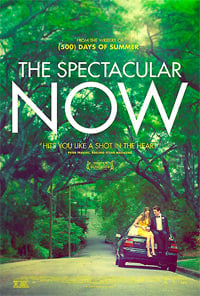The Spectacular Now: Director James Ponsoldt Talks Filmmaking And Problems With Hollywood
When did you become familiar with the book The Spectacular Now?
James Ponsoldt: I had heard of the book when it was nominated for the national book award about five years ago, although I could be off by a year or two, but I hadn’t read it. The after Smashed was at Sundance in 2012, pretty soon there after the producers approached me. The script had already been written by Scott Neustadter and Mike Weber, and I was aware of them from 500 Days of Summer. I read the script and it really, I guess I had apprehension initially, because I wasn’t really interested in directing someone else’s script, but it was one of the fastest reads I’ve ever had, and it was probably one of the best depictions of adolescence I’ve ever read. I immediately read Tim Tharp’s novel after that, and the novel’s fantastic.
In the press notes you said, “American adolescence has become marginalized.” In a way I think that rings true, but I find it ironic too as almost every Hollywood movie tries to capture that teen audience. Can you talk about that more?
James Ponsoldt: Sure, I think they haven’t marginalized their desire to take their cash. They’ve marginalized respecting fundamentally what it is to be that age I think. I wouldn’t say it’s necessarily specific to teenagers. I think they marginalize the experience of what it is to be 6 or 30 or 50 or 70 or whatever. They’re really not that interested. For the most part it’s all profit driven. It’s multinational corporations that need to make lots of money and they need to sell product which usually works out to action figures. They need things that can be ready-made and have a ready-made audience, because they’re based on a pre-existing property or things that can be sequeled. So most of the movies that studio executives would be quick to have posters go up on the wall like Five Easy Pieces, Nashville, McCabe & Mrs. Miller, Psycho, or whatever they would never in a million years make those movies. They couldn’t. They would be fired if they tried to. So there’s kind of been these creative handcuffs I think. I don’t think there are a lot of films about teenagers that approximate… depict them as complicated human beings and respect them or depict their lives actually in a way that might actually resemble their own without having to sort of turn them into vampires or werewolves.
Has growing up in the south impacted your style of filmmaking?
James Ponsoldt: Yeah, but it’s taken a while. When I was first really seriously making short films, when I went to film school… I definitely was obsessed with the idea of regional filmmaking. People like Terrence Malick, John Sayles, Victor Nuñez, Ross McElwee, or Julie Dash… people that were telling stories set in the south and dealing with sociopolitical issues I guess and the politics of representation. Things like that I was like okay that’s kinda my thing. That’s what I am, but I had a weird upbringing. Even though I was born and raised her my parents are from northern New Jersey. Kids would bust my balls and call me “Yankee” and stuff, because I wasn’t seven generations deep. I guess I always felt a slight sense of outsiderness where I was, so I’m just particularly sensitive to the idea of regionalism and really what that means. I think when I was younger I really latched onto it in superficial ways, and since I’ve left…I think I’ve really come to appreciate a quality of life people relate to the environment, relate to their own history, and relate to a history that goes back 150 years…. or that’s more recent. Whether that’s having the Olympics here in ’96, the Civil Rights Moment in the 60s, or whether it was having the Civil War here.
One of my favorite books, which I think is one of the great southern books of modern time, is The Moviegoer by Walker Percy. I think he wrote in ’61 or ’62 – and that’s in New Orleans and other parts of Louisiana. But when he won the National Book Award someone asked him why he thought there were so many great southern writers. And he gave this really piffy, short answer. He said, “It’s because we lost the war.” And I think it’s great. It’s like people who win wars, it’s like a bully, bullies beat the s*** out of someone and then they move on with life. Kids that get beat up or lost something – they’re constantly reliving it.
THE SPECTACULAR NOW opens in Atlanta exclusively at the Regal Tara on FRIDAY, AUGUST 16. It is rated R.



I haven’t read the book yet, but i’m very interested in the movie, it has got very good reviews so far.
Very good interview,Emma!
Thanks for the interview, love it “…creative handcuffs”! I am looking forward to seeing the movie even more now.